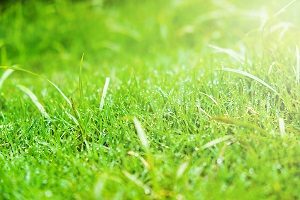
When it comes to grass, you’ve always got options. From sod to seeding, you’re often looking at many species of grasses that fill diverse needs: from growing times, to weather resistance, to drought resistance – and that’s not even considering factors like their appeal or if they are invasive or native. However, most grasses do fit into one of two categories: warm season grasses or cool season grasses. This article is going to look at the two types of grasses, help you understand their differences, and help you find the right one for your project.
Continue reading Warm Season Grasses vs. Cool Season Grasses
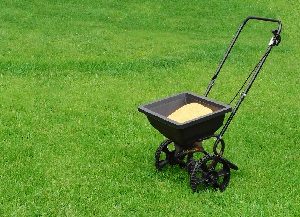 In a previous blog, we addressed why you should be fertilizing your lawn. However, that brings up another point: when should you be fertilizing your lawn? While the short answer that fertilizer is food and you should feed your lawn when it’s growing the most, knowing exactly when that is and how often aren’t always so clear. For your lawn, this blog is going to help you identify what’s the optimal time to fertilize and how different fertilizers affect when and how often you should fertilize your lawn. Continue reading When Should You Fertilize Your Lawn?
In a previous blog, we addressed why you should be fertilizing your lawn. However, that brings up another point: when should you be fertilizing your lawn? While the short answer that fertilizer is food and you should feed your lawn when it’s growing the most, knowing exactly when that is and how often aren’t always so clear. For your lawn, this blog is going to help you identify what’s the optimal time to fertilize and how different fertilizers affect when and how often you should fertilize your lawn. Continue reading When Should You Fertilize Your Lawn?
 In a previous blog, we addressed why you should be fertilizing your lawn. However, that brings up another point: when should you be fertilizing your lawn? While the short answer that fertilizer is food and you should feed your lawn when it’s growing the most, knowing exactly when that is and how often aren’t always so clear. For your lawn, this blog is going to help you identify what’s the optimal time to fertilize and how different fertilizers affect when and how often you should fertilize your lawn. Continue reading When Should You Fertilize Your Lawn?
In a previous blog, we addressed why you should be fertilizing your lawn. However, that brings up another point: when should you be fertilizing your lawn? While the short answer that fertilizer is food and you should feed your lawn when it’s growing the most, knowing exactly when that is and how often aren’t always so clear. For your lawn, this blog is going to help you identify what’s the optimal time to fertilize and how different fertilizers affect when and how often you should fertilize your lawn. Continue reading When Should You Fertilize Your Lawn?
 Summer is a great time to get out there and enjoy your lawn, from fun and games on the front lawn to a nice relaxing afternoon in the backyard. However, summer can also bring some issues you need to deal with to avoid lawn damage and a high water bill, something especially important in drought conditions. Below are some tips and tricks for summer lawn care and your irrigation systems so you can get the most out of them and avoid troubles down the line – letting you enjoy more of your summer!
Summer is a great time to get out there and enjoy your lawn, from fun and games on the front lawn to a nice relaxing afternoon in the backyard. However, summer can also bring some issues you need to deal with to avoid lawn damage and a high water bill, something especially important in drought conditions. Below are some tips and tricks for summer lawn care and your irrigation systems so you can get the most out of them and avoid troubles down the line – letting you enjoy more of your summer! 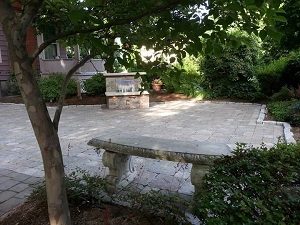 Patios are a wonderfully flexible way of extending the living space of your home, allowing you to work, play, and relax just a few short steps from your door. If you’re looking at getting a patio installed, you have many options on the design, to both suit the needs of the space for you, as well as a style that complements the rest of your home and landscape. Below are some basic design and feature ideas to give you an idea of the possibilities available for patio construction.
Patios are a wonderfully flexible way of extending the living space of your home, allowing you to work, play, and relax just a few short steps from your door. If you’re looking at getting a patio installed, you have many options on the design, to both suit the needs of the space for you, as well as a style that complements the rest of your home and landscape. Below are some basic design and feature ideas to give you an idea of the possibilities available for patio construction. 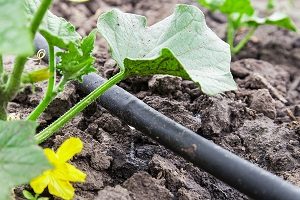 There are many options to choose from when it comes to landscape irrigation for your home or business, and it is a vital part of maintaining great lawns and plants. From soaker hose and drip irrigation lines to keep gardens and other plants watered in the most efficient way, to sprinkler/spray systems, all the way to industrial-strength rotor systems for large estates or commercial lawns. Today we’ll look at a popular choice for gardens and landscaping plants: drip irrigation system lines and soaker hoses that can be installed into your garden to cut down on work and wasted water.
There are many options to choose from when it comes to landscape irrigation for your home or business, and it is a vital part of maintaining great lawns and plants. From soaker hose and drip irrigation lines to keep gardens and other plants watered in the most efficient way, to sprinkler/spray systems, all the way to industrial-strength rotor systems for large estates or commercial lawns. Today we’ll look at a popular choice for gardens and landscaping plants: drip irrigation system lines and soaker hoses that can be installed into your garden to cut down on work and wasted water. 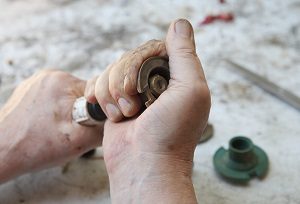 When the ground freezes, so can your irrigation system. From sprinkler heads to in-ground pipes, when irrigation components freeze, any remaining water inside can freeze too. Forgot to perform winterization on your irrigation systems? This can cost you as that water expands when freezing into ice, warping and cracking your pipes and sprinkler heads. Below we look at the two most common issues on irrigation systems after winter, and what it takes to solve them.
When the ground freezes, so can your irrigation system. From sprinkler heads to in-ground pipes, when irrigation components freeze, any remaining water inside can freeze too. Forgot to perform winterization on your irrigation systems? This can cost you as that water expands when freezing into ice, warping and cracking your pipes and sprinkler heads. Below we look at the two most common issues on irrigation systems after winter, and what it takes to solve them. 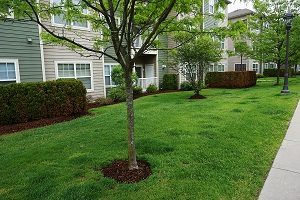 From singular landlords to property management companies, the management of an apartment or apartment complex is just that: complex. However, while you’re focusing on the buildings and apartment units themselves, it’s important to look at the entire property – most notably your apartment grounds. This article is going to focus on landscaping projects and maintenance that won’t only keep current tenants happy, but also help you attract new ones.
From singular landlords to property management companies, the management of an apartment or apartment complex is just that: complex. However, while you’re focusing on the buildings and apartment units themselves, it’s important to look at the entire property – most notably your apartment grounds. This article is going to focus on landscaping projects and maintenance that won’t only keep current tenants happy, but also help you attract new ones.  When it comes to grass, you’ve always got options. From sod to seeding, you’re often looking at many species of grasses that fill diverse needs: from growing times, to weather resistance, to drought resistance – and that’s not even considering factors like their appeal or if they are invasive or native. However, most grasses do fit into one of two categories: warm season grasses or cool season grasses. This article is going to look at the two types of grasses, help you understand their differences, and help you find the right one for your project.
When it comes to grass, you’ve always got options. From sod to seeding, you’re often looking at many species of grasses that fill diverse needs: from growing times, to weather resistance, to drought resistance – and that’s not even considering factors like their appeal or if they are invasive or native. However, most grasses do fit into one of two categories: warm season grasses or cool season grasses. This article is going to look at the two types of grasses, help you understand their differences, and help you find the right one for your project. 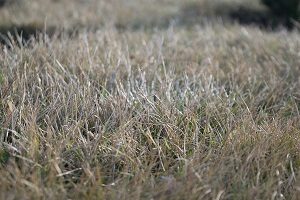 It might feel like winter will never be over, especially with all the subzero temperatures recently. However, spring is just a few months away. While there is still snow on the ground and ice in the gutters, it’s time to start thinking about spring and what you should be doing early on to make sure your lawn is in peak condition as soon as possible. Here are our tips for spring lawn care.
It might feel like winter will never be over, especially with all the subzero temperatures recently. However, spring is just a few months away. While there is still snow on the ground and ice in the gutters, it’s time to start thinking about spring and what you should be doing early on to make sure your lawn is in peak condition as soon as possible. Here are our tips for spring lawn care.  When it comes to landscaping your yards and garden, it’s important to take your pets into consideration if they like to head outside. This can range from overhauling your outdoor living space to be more pet-friendly to picking the right plants and fertilizers to avoid making them sick. The following are several things to keep in mind when talking to a contractor about
When it comes to landscaping your yards and garden, it’s important to take your pets into consideration if they like to head outside. This can range from overhauling your outdoor living space to be more pet-friendly to picking the right plants and fertilizers to avoid making them sick. The following are several things to keep in mind when talking to a contractor about 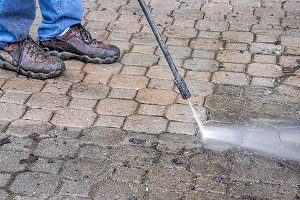 From patios to walkways and retaining walls, the hardscape on your property is both functional and beautiful. And while a well-made hardscape will last for years, it’s important to spend some time each year making sure it’s not only looking its best, but also still structurally sound. Below you’ll find some basic tips for maintaining your hardscape as well as making sure it stays beautiful for years to come.
From patios to walkways and retaining walls, the hardscape on your property is both functional and beautiful. And while a well-made hardscape will last for years, it’s important to spend some time each year making sure it’s not only looking its best, but also still structurally sound. Below you’ll find some basic tips for maintaining your hardscape as well as making sure it stays beautiful for years to come.